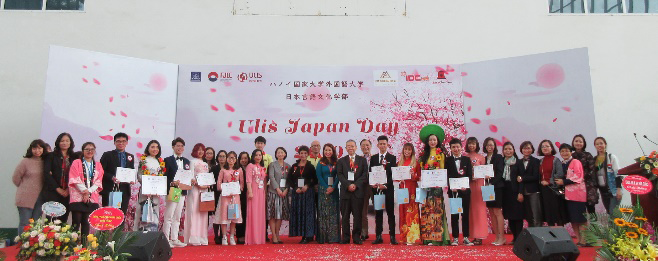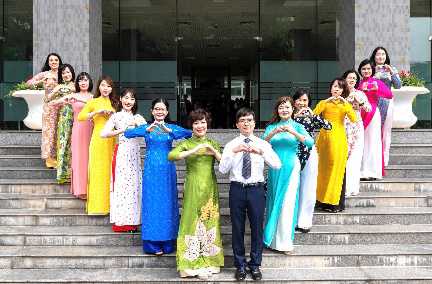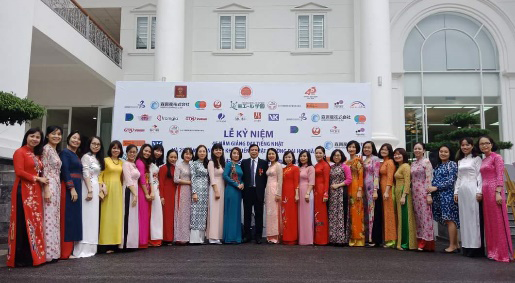The Japan Foundation Awards (2021)
For 2021, which marks the 48th time of the Awards, the four recipients listed below have been selected after the screening of 101 applications nominated by experts and the general public, including those of the 2020 Awards canceled due to COVID-19 pandemic.
KOREEDA Hirokazu (Film Director) [Japan]

(c) Tamotsu Fujii
Koreeda Hirokazu is a preeminent director in the Japanese and international film industry. Not only does he direct, but he also is a screenwriter and editor. He remains connected to ordinary people and the subtleties of their lives, while constantly questioning the reality of modern Japanese society by depicting neglected children or a surrogate family who make a living through stealing. These films are full of deep insights into humanity and have received high praise across the globe.
Born in Tokyo in 1962, he became interested in films under his mother’s influence after spending his youth at a housing complex in Kiyose City, which he would later depict in After the Storm (2016). Studying at the Faculty of Letters, Arts and Sciences I at Waseda University, he created an original script as his graduation thesis in the School of Humanities and Social Sciences. Upon joining the production company TV Man Union, he distinguished himself as a television documentary director, starting with However… (1991). In 1995, his directorial debut, Maborosi, won the Venice International Film Festival’s Golden Osella, and in 2004, Nobody Knows was honored with the Best Actor Award (Yagira Yūya) at the Cannes Film Festival. He continued to direct one notable work after the other, winning the Palme d’Or at the Cannes Film Festival in 2018 for Shoplifters. He was only the fourth Japanese director to win this award, joining the ranks of Kurosawa Akira and Imamura Shōhei. He is also actively involved in educating the next generation by establishing the production company BUN-BUKU in 2011 together with director Nishikawa Miwa, as well as guiding film production after assuming the role of professor in the Department of Intermedia Art and Science, School of Fundamental Science and Engineering at Waseda University in 2014.
He has been ambitious toward international exchange through filmmaking from early on in his career, casting Korean Bae Doona as the lead and featuring Taiwanese Mark Lee Ping-bing for cinematography in Air Doll (2009). He has worked even harder in recent years, filming The Truth (2019), a Japanese-French collaborative film with many French staff and cast, including Catherine Deneuve and Juliette Binoche. Currently, he is working on Broker (working title), bringing together Japan and South Korea despite the difficulties of the pandemic and working with South Korean actors and staff, including Song Kang-ho and Gang Dong-won. The completion of this work has been much anticipated.
Such endeavors have greatly contributed to the promotion of mutual global understanding over many years through films and demonstrate that his achievements are deserving of the Japan Foundation Award.
MIYATA Mayumi (Shō (Japanese wind instrument) performer) [Japan]

Miyata Mayumi, a leading performer of a traditional gagaku (ancient Japanese court music) instrument known as the shō (Japanese wind instrument), has performed at the National Theatre of Japan since 1979. She began offering shō recitals in 1983 and has garnered attention since then. In addition to classical gagaku music, she has premiered new works by masters of modern music, including John Cage, Takemitsu Toru, Helmut Friedrich Lachenmann and Hosokawa Toshio, and has showcased the potential of traditional gagaku instrument to the world.
She has performed with numerous orchestras, including the Saito Kinen Orchestra, the NHK Symphony Orchestra, the New York Philharmonic, the Deutsches Symphonie-Orchester Berlin, the Bamberger Symphoniker, the Orchestre national de Lyon, the BBC Symphony Orchestra, the Czech Philharmonic Orchestra and the Orchestre Symphonique de la Monnaie. She has also performed in famous music festivals around the world, including those in Salzburg, the Wien Modern, Lucern, Donaueschingen and Tanglewood. She was also highly acclaimed for her performance of the national anthem of Japan at the opening ceremonies of the Nagano Winter Olympics held in 1998.
She has worked with prominent artists and shown the charm of the shō to the world. She was selected as a crucial soloist in The Little Match Girl, an opera by German composer Helmut Lachenmann, which premiered in Hamburg, Germany, before traveling to France, Austria, Switzerland and Argentina. She has also performed with Czech contemporary dance choreographer Jiří Kylián.
Moreover, she has premiered and performed many works by Japan Foundation Award composers Takemitsu Tōru (received the award in 1993) and Hosokawa Toshio (received the award in 2018) around the world. Her achievements are deserving of the Japan Foundation Award as she has had a major influence on the compositions of these composers and has contributed to the promotion of mutual global understanding over many years through the shō, a traditional gagaku instrument. She will be awarded the Japan Foundation Award in recognition of her achievements.
Faculty of Japanese Language and Culture, University of Languages and International Studies - Vietnam National University, Hanoi (VNU) /
Faculty of Japanese, Foreign Trade University /
Department of Japanese Studies, Hanoi University [Vietnam]

Faculty of Japanese Language and Culture,
University of Languages and International Studies -
VNU(ULIS Japan Day)

Faculty of Japanese,
Foreign Trade University

Department of Japanese Studies,
Hanoi University
The development of Japanese-language education in Vietnam in recent years is remarkable. According to the Japan Foundation’s Survey on Japanese-Language Education Abroad 2018, Vietnam was sixth globally for the number of students of the language. This was a 2.7-fold increase in the number of learners and a 3.7-fold increase in the number of schools compared with three years prior in 2015, making it the greatest learner increase in any country in the world. The number of people taking the Japanese Language Proficiency Test (JLPT) increased by 219 times to reach 69,843 in 2018, only 22 years after the first time the test was offered to 319 people in 1996.
Behind this development are the economic exchange through the good relationship between Japan and Vietnam, an increase in cultural exchange, the resulting increase in the number of Japanese companies making inroads into the country and opportunities to work in Japan. These factors in turn have had a positive effect on the re-establishment of systems including the start of Japanese-language education as the primary foreign language in primary and secondary schools in Vietnam.
The basis for this development is found in three schools offering Japanese-language education, namely, the University of Languages and International Studies – Vietnam State University, Hanoi, the Foreign Trade University, and Hanoi University (formerly the College of Foreign Languages). The Foreign Trade University began offering Japanese education in 1961 and has since developed human resources in the economic as well as diplomatic and administrational areas. Meanwhile, Hanoi University, which started Japanese education in 1973, has produced promising young professionals mainly as interpreters and translators and established a Japanese master’s program in 2010. The University of Languages and International Studies, which started its Japanese education in 1992, hosts Vietnam’s only Japanese teacher training course capable of cultivating official Japanese-language teachers for primary and secondary schools and established the country’s first Japanese master’s program in 2009. The excellent human resources developed by the three schools have created a strong bond between Vietnam and Japan over many years. At the same time, these three schools joined forces and contributed to the expansion of Japanese-language education in primary and secondary schools.
The three universities cooperated to take on an initiative in 2017 on the wave of greater interest in Japanese-language education, thereby establishing the Association of Japanese Linguistics and Education in Vietnam, the first organization of its kind in Vietnam, after negotiating with universities across Vietnam offering Japanese-language courses. This Association holds workshops in Ho Chi Minh City and Huế, promoting active academic activities.
This organization’s achievements are deserving of the Japan Foundation Award, as they have led to support of Japanese-language education in Vietnam and have contributed to talent development and the promotion of mutual global understanding over many years. This organization will be awarded the Japan Foundation Award as further success is expected.
Irmela Hijiya-Kirschnereit (Professor, Free University of Berlin) [Germany]

(c) Pablo Castagnola
Prof. Dr. Irmela Hijiya-Kirschnereit is a researcher in Japanese culture, a literary critic and a translator representing not only Germany but all of Europe. Since receiving her doctorate of literature from Ruhr University Bochum in 1975, she has worked as an assistant professor at the Faculty of Social Sciences at Hitotsubashi University and as a professor in the Department of Japanese Studies at the University of Trier. Since 1991, she has been a professor at the Free University of Berlin’s Institute of Japanese Studies. During this time, she held the positions of head of the German Institute for Japanese Studies and president of the European Association for Japanese Studies, and was selected as a member of the Berlin-Brandenburg Academy of Sciences and Humanities and the European Academy. Over her illustrious career, she was awarded the Gottfried Wilhelm Leibniz Prize in 1992, the Federal Cross of Merit of Germany in 1995 and the Eugen and Ilse Seibold Prize in 2001.
In her doctoral dissertation (1976), which brought her great renown, she structurally reinterpreted Mishima Yukio’s novel, Kyōko no ie (Kyōko’s House), not only in relation to his other works but also in relation to various literary subsystems. In her habilitation thesis (published in 1981), which added to her reputation, she took up the uniquely Japanese literary form of autobiographical novels. She described this genre as something that is beyond a simple articulation of private affairs but instead an expression of the process of literary communication established between the author, reader and the literary world. Both of her papers place literary works within a socio-cultural system.
In her research, she has consistently been aware of the delicate balance between heterogeneity and universality. As seen in Das Ende der Exotik (A Farewell to Exoticism published in 1988), she does not condone the spread of simplistic clichés about Japan. She also has an interest in the genre of joryū bungaku, literature by female writers. While interacting with many female Japanese writers, including Ishimure Michiko, she discovers their progressiveness and universality. From there, for example, she developed her work on discovering global historical meanings in the sexual perversion told by Kōno Taeko and others from the 1960s. At the same time, her outstanding skills are found in the fact that she finds connections with different cultures by weaving the cultural differences and heterogeneity of Japanese literary forms, such as autobiographical novels and journals, into universal language that anyone can understand. In this sense, she is an extraordinary translator.
Prof. Dr. Hijiya-Kirschnereit has guided the next generation and educated many researchers at the Free University of Berlin for many years. While she strives to widely introduce various aspects of Japanese culture, from haiku to bonsai and Japanese food, she has made a tremendous contribution to the mutual understanding, friendship and goodwill between Japan and Germany as well as Japan and Europe by being willing to stand on the frontlines of criticism to correct misunderstandings about Japan, as was evident for example during the Great East Japan Earthquake. These achievements over many years demonstrate that she is deserving of the Japan Foundation Award.
- The Japan Foundation Awards
- The Japan Foundation Awards Recipients, Presentation Ceremony and Commemorative Events in Previous Years
[Contact Us]
The Japan Foundation Public Relations Div.
Tel. +81-(0)3-5369-6075
Fax: 03-5369-6044
- What We Do Top
- Arts and Cultural Exchange [Culture]
- Japanese-Language Education Overseas [Language]
- Japanese-Language Education Overseas [Language] Top
- Learn Japanese-language
- Teach Japanese-language
- Take Japanese-Language Test
- Know about Japanese-language education abroad
- The Japanese-Language Institute, Urawa
- The Japanese-Language Institute, Kansai
- Japanese-Language Programs for Foreign Specified Skilled Worker Candidates
- Japanese Language Education for Japanese Children Resident Overseas and for the Descendants of Migrants
- Archives
- Japanese Studies and Global Partnerships [Dialogue]
- JF digital collection
- Other Programs / Programs to Commemorate Exchange Year
- Awards and Prizes
- Publications
